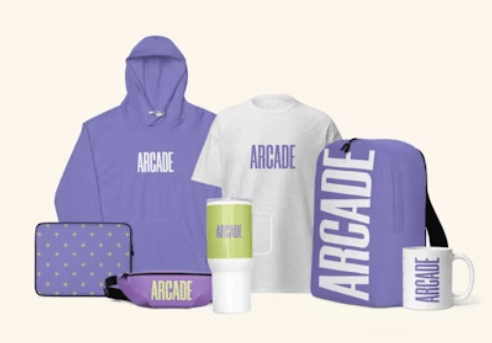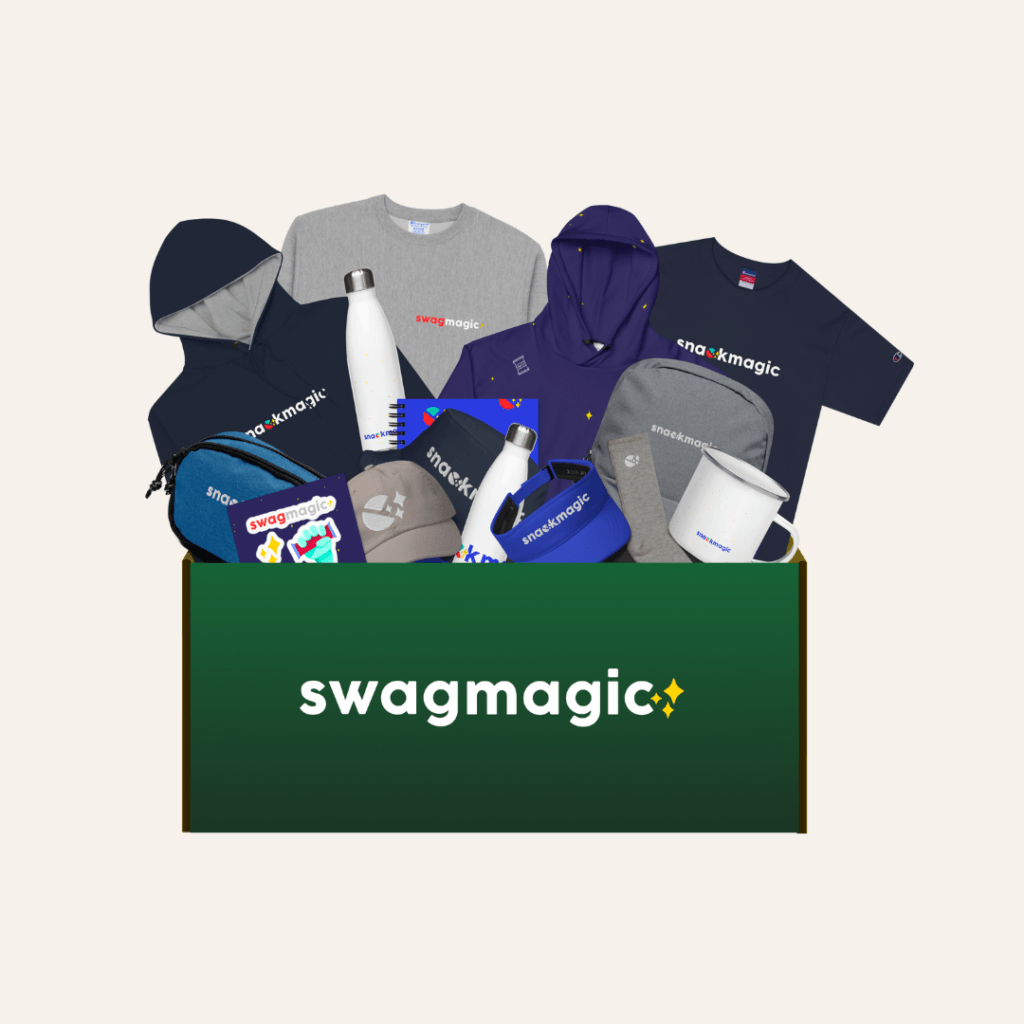Events are a powerful way for brands to engage with current and potential customers. From conferences, virtual event to local meetups, events create memorable interactions between a brand and its audience. As such, events should play an integral role in any company’s marketing strategy.
In this blog post, we’ll explore event marketing strategies and provide tips for creating promotional plans around your events. Whether you’re organizing small gatherings or massive productions, strategic planning and promotion is key to event success. Read on to learn how to make your next event a true success.

How SwagMagic can help your brand?
- Bulk Buy & Save on your gifts!
- Curate Customized Swag Boxes!
- Launch Your Store for your employees!
- Secure Swag Storage with us!
What is an Event Marketing and Promotion Strategy?
An event marketing strategy is a strategic plan to leverage in-person events for promoting a brand, generating leads, and fostering engagement with target audiences. The strategy covers key factors like identifying the right events, defining measurable goals, promoting the events, and creating an engaging experience for attendees.
A strong event strategy aligns with a company’s overall marketing objectives and core brand messaging. It provides a blueprint for executing events that deliver meaningful ROI and help build relationships between the brand and consumers.

Marketing and Promotions Strategy for Events and Conference with Promotional Gifts, Swag and Giveaways (Unique Ideas)
1. Custom Conference Swag and Personalized Event Giveaways and Gifts
Swag isn’t just about giving away freebies; it’s about value and memory creation:
- Personalize Event Swag Items: Customized items, be it T-shirts, Mug, or tote bag with conference attendee names or themed bookmarks, ensure the recipient feels valued and recognized.
- Swag Bags as Event Giveaways for Early Birds: Promote early ticket purchases by offering limited-edition swag bags filled with snacks. This tactic not only rewards prompt decisions and lasting impression but can also create social media buzz as attendees showcase their loot.
- Brand promotion- Giving away promotional products with brand logo like high-quality headphone, notebook, tumbler and pen increases your chances of getting noticed and remembered.

- Social Media Contests: Encourage event attendees to share photos of their swag or use a specific event hashtag. This user-generated content acts as a word-of-mouth recommendation, often more trusted than traditional advertising.
- QR Codes and Digital Integration: Attach QR codes to physical items that lead to online resources, be it event schedules, speaker profiles, or exclusive content. This seamless integration of offline and online creates a holistic attendee experience.
- Engage Influencers: By providing influential figures in your industry with exclusive swag, you can leverage their platforms for additional visibility, reaching their vast audiences with a personal touch.
2. Digital Marketing and Social Media
Harness the power of platforms like Facebook, Instagram, Twitter, and LinkedIn. By creating event pages or specific hashtags, you create a space for potential attendees to learn more, engage, and share. Paid ads, targeting specific demographics, can amplify your reach. Also, consider teaser videos, behind-the-scenes content, or Q&A sessions for building anticipation.
Curate the perfect box of handpicked gift they’ll love and send joy their way

3. Email Campaigns
Email remains a potent tool for event promotion. Start by segmenting your audience – first-timers, repeat attendees, VIPs, etc. Personalize the content to speak directly to their interests or past engagement. Incorporate visually appealing graphics, countdown timers, and strong call-to-action buttons to improve conversions.
4. Collaborations and Partnerships
By collaborating with industry influencers or like-minded businesses, you pool together resources and audiences. Joint webinars, shared blog posts, or mutual shoutouts can dramatically boost visibility. This approach lends additional credibility to your event, especially if the partners are respected in the domain.
5. Traditional Media
Even in the digital era, traditional media like newspapers, radio, and TV still wield influence. For local events, these mediums can tap into an audience segment that might be less online-active, ensuring your event garners a broader spectrum of attendees.

6. SEO and Content Marketing
Consistently publish content around your event’s theme. This could be blog posts, guest articles, or interviews. When these are optimized for search engines with relevant keywords, they drive organic traffic to your event page, helping in longer-term visibility and credibility building.
7. Feedback Loops
Post-event engagement is crucial for refining future strategies. Using surveys, feedback forms, or interactive polls helps in acertaining what worked and what didn’t. More importantly, it communicates to the attendees that their opinion is valued, fostering a deeper connection.
Why is Event Marketing Important for Small Businesses and Nonprofits?
For small businesses and nonprofits, event marketing strategies can be extremely beneficial despite often limited marketing budgets. Events provide an opportunity to:
- Raise brand awareness within the local community
- Connect directly with customers/donors face-to-face
- Generate word-of-mouth buzz and exposure
- Cultivate loyalty among existing customers or donors
- Recruit new supporters, volunteers, or influencers
- Share your organization’s mission and story
With strategic planning, small businesses and nonprofits can execute impactful events that support critical growth and engagement goals.
How to Plan an Event Marketing Strategy?
Define what success looks like for each goal – number of leads, increase in social followers, sales tied to event, etc. This gives you clear targets to measure against.
Identify your target audience – Get very specific on who you want to have attend your events. Detail their demographics, interests, challenges, and values. This will allow you to choose events, craft messaging, and create experiences tailored specifically to resonate with your targets.
Choose the right events – Events should clearly align with your goals and target audience. Thoroughly research events and weigh factors like audience reach, costs, logistics. Prioritize events likely to deliver the highest ROI in terms of your specific event goals.
Promote effectively – Spread awareness of your event participation through all available channels – email, social media, website, ads, existing customer communications, PR, etc. Share key details, highlights, and calls to action regularly leading up to the event.
Create an engaging experience – The event itself is your chance to shine. Have compelling speakers or activities. Offer giveaways, entertainment, refreshments, or other incentives to leave a great impression.
Follow up with attendees – Don’t let your event impact end when it’s over. Collect attendee contact information and follow up to share photos, highlights, offers, and more. Continue nurturing event connections into lasting relationships.
Marketing Trends You Cannot Ignore
Alright, folks, let’s dive into some marketing trends that are hotter than a summer’s day! First up, we’ve got influencer marketing, where your favorite social media stars help spread the word. Then there’s sustainability and being a good global citizen – people dig brands with a heart. Oh, and interactive content and personalized experiences are like catnip for your audience. And don’t forget data, because making decisions based on numbers is the way to go!
- Influencer marketing – Rather than just having your own spokespeople, brands should form partnerships with relevant social media influencers, industry bloggers, and community leaders to help promote and participate in events. They bring built-in audiences and credibility.
- Experiential marketing – Events should engage attendees through interactive experiences like games, VR/AR, hands-on demos, and share-worthy moments. The days of passively listening to presentations are gone.
- Personalization – Use collected attendee data and insights to tailor the event. Guide people toward specific sessions, provide customized recommended schedules, and offer relevant suggestions based on their interests.
- Video marketing – Share live streams, compiled highlight reels and behind-the-scenes videos on social media and YouTube before, during and after to maximize reach and buzz. Short video ads can also drive registrations.
- Social media – Encourage conversations on platforms like Instagram, Twitter and LinkedIn. Attendees should be able to easily share their experience and interact with other attendees.
Strategies That Will Drive Demand to Your Events
Planning an event and want everyone and their uncle to show up? Here’s the scoop: Use a bunch of marketing channels, like social media, emails, and cool content to spread the word. Create buzz with early bird discounts and exclusive perks. Partner up with influencers who know their stuff and have a gazillion followers.
- Spotlight exclusivity – Promote the unique experiences, celebrity guests, or insider access attendees will gain. Emphasize limited capacity and encourage early registration.
- Promote engagement – Share specific interactive elements attendees can partake in rather than keeping as surprises. Showcase Q&A sessions with leaders, games, contests, parties and more.
- Word-of-mouth promotion – Provide incentives for existing customers and partners to share event info through emails, social posts and conversations. A little motivation goes a long way.
- Retargeting ads – Display customized ads promoting the event to those who already visited your site or similar events. Repeated exposure equals top of mind awareness.
- Past success stories – Collect stellar photos, videos, testimonials and metrics from past events. Then prominently promote on all marketing channels to build excitement.
The Evolution of Technology in Event Marketing
Tech is changing the event game big time! We’ve gone from traditional events to virtual and hybrid extravaganzas. Augmented reality, virtual reality, event apps, AI chatbots – they’re all in the mix now. So, keep up with the latest tech to make your events rock.
- Hybrid events – Offer both a physical location for local attendees and a virtual live stream for remote attendees. Use multiple cameras and mics so remote viewers feel immersed.
- Event apps – Let attendees access schedules, speaker info, maps, networking tools and offers via a custom mobile app. Apps keep everything in one place.
- Gamification – Increase participation and competition through social media contests, scavenger hunts using event apps, and prizes for answering session trivia.
- Interactive tech – Wow attendees with smart screens, digital leaderboards, VR experiences, RFID interactions and more to create an engaging, tech-driven environment.
- Facial recognition – Integrate facial recognition technology for seamless check-in. It can also help gather data like demographic info and session attendance patterns.
The Future of Event Marketing
Picture this: the future of event marketing is like a sci-fi movie. Virtual and hybrid events are going to be everywhere, bringing the whole world closer. AI will be your event buddy, making things super personalized. And everyone’s going green, so sustainable events will be a hit. Plus, blockchain tickets and 5G connections will make everything smoother. In a nutshell, it’s going to be a wild ride, and event marketing will be all about keeping up with the cool and cutting-edge stuff.
- Further hybrid event growth – Events will accommodate both local and global audiences through sophisticated live streaming and remote participation options.
- Laser focus on ROI – There will be increased rigor around setting measurable goals and using data to evaluate and demonstrate concrete event results.
- Blending digital and live – Digital marketing campaigns will tie directly into live events through corresponding timing, messaging, retargeting, and channel integration.
- Real-time event analytics – Platforms will capture granular attendee data and event metrics in real time so organizers can instantly adjust to optimize experiences.
- Creative event swag – Rather than generic swag, takeaways will be thoughtful, useful and Instagram-worthy. For example, video highlights pre-loaded onto branded thumb drives.
Exciting Times Ahead: Navigating the Ever-Evolving World of Event Marketing
Events present hugely valuable opportunities for brands to engage audiences and achieve key marketing goals. By identifying your objectives, targeting the right events and audiences, utilizing current marketing trends and technology, and promoting strategically across channels, companies can execute events that attract attendees and drive measurable impact. Keep these best practices in mind to get the most out of your next event.
By leveraging the strategies outlined, you can craft an unforgettable event experience that starts well before the main event and lingers long after it concludes. The key lies in understanding your audience, being genuine in your approach, and continuously evolving based on feedback and industry trends. Happy promoting!

Leave a Comment